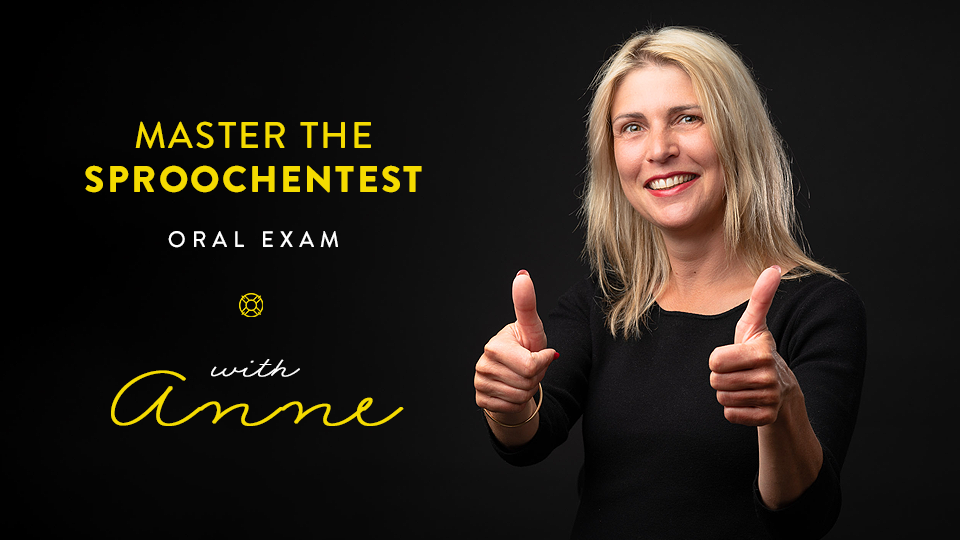If you feel like you are not making progress with your spoken Luxembourgish , then read on because this lesson is going to help you improve your speaking skills for Sproochentest.
I am going to give you 5 simple tips you can do everyday that will improve your Luxembourgish speaking, and will help you to get ‘unstuck’ and to do really well in your Sproochentest Oral Exam.
1. Learn Speaking by Listening
You surely know that we have been speaking for much longer than we have been writing, right.
So, it makes sense that we should learn to speak by listening to people speak, not by only reading words.
Yet so many people try to learn to speak through reading books often reading aloud. We can see this in classrooms around the world. But the world has changed!
You find native speaker voices anywhere on the Internet. So I propose you should learn to speak by listening actively for example to short items on the Luxembourgish radio stations
The benefits are:
- You learn natural Luxembourgish
- You know it’s spoken language
- You learn pronunciation
- You get context
Use spoken language to learn how to speak.
2. Repeat and Juggle
A great way to automate your vocabulary (that means you can use it automatically without thinking) is to follow this simple 3-step method:
- Listen
- Repeat
- Juggle
So, for example, you hear this phrase:
Mir gefält Lëtzebuerg
you then repeat it aloud.
After that, you repeat it but changing one word. Do this several times, changing for a new word each time. Play with the language and have fun. So you might say:
- Mir gefält Lëtzebuerg gutt
- Mir gefält London net
- Mir gefält Paräis ganz gutt
Finally you repeat by adding or changing several words or juggling with the word order. So you might say:
- Mir gefält meng Aarbecht
- Meng Aarbecht gefält mir
- Meng Aarbecht gefält mir immens gutt
- Mir gefält däin neie Brëll
- Däin neie Brëll gefält mir net esou gutt
3. Focus on Chunks
One of the best ways to increase your fluency is to focus on chunks.
What is a chunk?
A chunk is simply a piece of language. So, maybe 2 to 4 words that are usually spoken together.
Chunks appear almost everywhere in spoken Luxembourgish. Here are examples of chunks:
- zu Mëtteg iessen
- zu Owend iessen
- ech drénke Kaffi (I have breakfast)
- dat hänkt dovun of
- ech fuere Vëlo
- ech fuere Schi
- eng Foto maachen
- e Rendez-Vous ausmaachen
- eng Luucht ausmaachen
- mat menger Famill
When you learn individual words you have to think about putting each one together.
When you learn chunks, you no longer have to think about putting each word in place, you focus on putting the chunks in place.
This is easier, increases your fluency and will probably produce more accurate language.
Imagine building a wall brick by brick. It can be very slow. Now imagine you could build the wall, layer by layer, each layer having chunks of 3 or 4 bricks.
It is going to be faster and you will actually get a straighter better wall!
So instead of learning just individual words, focus on learning and practicing chunks.
4. Push your Comfort Zone
When studying we like to have a safe environment where we feel comfortable and happy studying, and that is a good thing.
At the same time, when you do the Sproochentest Oral Exam, it’s with a real person that you don’t know. You will feel uncomfortable. You will be nervous, and afraid of making mistakes.
So, it is really important that when you prepare for Sproochentest Speaking, you get used to feeling uncomfortable.
How can you do that?
Simple, just push your comfort zone. Do some Sproochentest Speaking practice where you feel uncomfortable, such as joining a speaking class, finding a teacher online, engaging with others.
Whatever it is, just start engaging with others and PRACTICING your Luxembourgish with a teacher.
After all, speaking Luxembourgish is all about communicating with others.
So push your comfort zone and you will see yourself slowly building your confidence as you speak.
5. Immerse Yourself in Natural Luxembourgish
Now studying with a teacher is perfect, and reading course books is necessary too. Most teachers will speak slowly and help you understand, correct your mistakes and be polite.
However, people in the real world usually don’t speak like most teachers do.
They speak quickly, expect you to understand and respond quickly too.
So it is essential that as well as learning from materials designed for Luxembourgish students, that you also learn from the real world.
You need to immerse yourself in natural Luxembourgish, so you can communicate effectively in the real world and in the Sproochentest Oral Exam.
There are some opportunities for language immersion (click to see the link).
- Videos
- Podcasts
- News broadcasts
- Series on Netflix: Capitani
Choose things you enjoy and find useful. At times, choose things that you wouldn’t usually choose, to expose you to new language and new topics. This will help you build confidence to talk on a wide range of topics (as required by the Sproochentest Oral Exam) not just your favourite ones!
Get the PDF!
With the online course Master the Sproochentest Oral Exam I share strategies, top tips and the experience I have gained over the years so that you can benefit of it, gain confidence and achieve your best score at the Sproochentest’s oral exam.
The 50-Day-Study-Plan shows you exactly what you should study, when you should study and how to get ready in 6 weeks with this self-paced online course.
The most flexible approach to Sproochentest preparation:
Study in any location, at any time and always at your own pace!
This course will help you strengthen and practice both your pronunciation and speaking skills.
ENROLL NOW!





